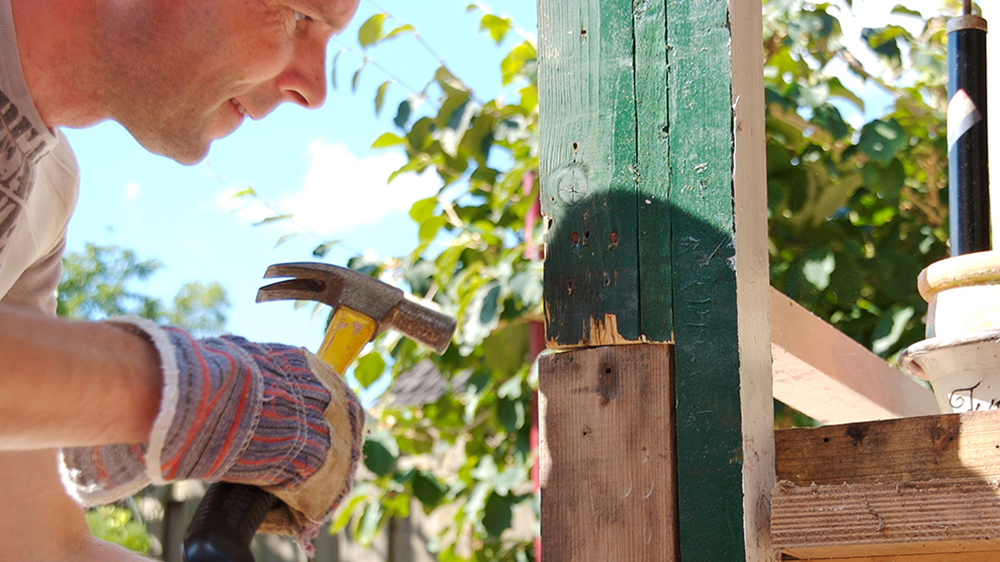8 DIY Projects That (Surprise!) Require Permits


Your insurance company won’t be on your side if something goes awry with your renovation and you don’t have a permit.
“Eh, we’ll just knock it out this weekend, not going to worry about the permit”… not so fast there partner. No shooting from the hip here! You can not only get into trouble with your insurance company and the local building department, but when it comes time for you to sell? You better have that permit in hand for these DYI improvements.
You might roll your eyes at having to get a permit before doing a DIY project around the house, but permits serve a purpose.
Permit requirements are just ways for the city to nickel-and-dime you to death, right? Is your city invading your privacy by caring whether you want to replace your overhead light fixture with a ceiling fan?
Before you get too worked up, realize that cities have their reasons for requiring permits. “Obtaining a permit means that someone knowledgeable will review your plans and help spot mistakes before you begin the work,” says Rick Goldstein, an architect and co-owner of MOSAIC Group in Atlanta, GA. If you make improvements without a permit, you might receive a big, fat denial letter from your insurance company when something goes wrong and you want to cash in.
You know the phrase “You don’t know what you don’t know”? Well, that’s the way it is with permits. That ceiling fan might be too heavy to hang from a box designed for a simple light fixture, especially when it’s going full blast and vibrating. You don’t want the fan falling on you while you sleep!
You might know some projects that require a permit, but you might be surprised by these eight DIY projects that typically require a permit too.
-
Installing a gas stove
Many people are making the switch from an electric to a gas stove. Depending on where you live, gas could be much cheaper, and if you’re a foodie, food just tastes better cooked over fire. But if installed incorrectly and the gas leaks, it could be extremely harmful. Get a permit and make sure someone is checking behind you to catch any mistakes.
-
Replacing windows or doors
If you think this project seems pretty straightforward, think again. For windows, you need a permit to ensure emergency egress requirements are met in case first responders need to get in. If windows and doors aren’t properly installed, water could get into the house. No one wants a side of mold with their renovations.
-
Building a deck
When dreams of outdoor living beckon, first call the permit office. If your deck isn’t structurally sound, or if you used untreated lumber that decays, your deck could collapse, and that could really interfere with your meditation mantra. And don’t even try to guess how to meet building codes for railings. Be safe and get that permit.
-
Putting up a fence
“Building a fence requires a survey and a permit,” Goldstein says. The reason for this is usually to ensure you aren’t violating city ordinances by building a fence too high in your residential subdivision or choosing one with barbed wire in the middle of the city. If you build a fence without a permit, you might receive a stop-work order.
-
Installing a storm shelter or safe room
If you want protection from tornadoes (and hurricanes), you might consider installing a shelter. But unless you design and construct this room to FEMA specs, you might not be so safe after all. A huge benefit of a prebuilding permit is that you can register it. “If there is a tornado in your area, first responders will know who has storm shelters and where they need to look for you in case you get trapped inside,” says Blake Lee of F5 Storm Shelters in Tulsa, OK.
-
Remodeling a kitchen or bathroom
Picking out the perfect granite for your countertops and finding just the right fixtures and cabinetry aren’t the only things on your checklist. If you neglect to get a permit for major remodeling work, you might not be able to easily sell your home in the future.
“If an inspector catches this kind of thing, or if a bank wants to make sure it’s covered against all liability and demands to see the permit before funding a mortgage, this can potentially be a major time and money sink to rectify,” says Kimberly Wingfield, a Philadelphia, PA, real estate agent and DIY fanatic.
-
Installing new electrical wiring
Your house in the historic district simply isn’t wired for all your gadgets — but an amateur electrical wiring job could cause a fire. This project definitely needs a permit.
-
Replacing a gas water heater
Surely you can replace your old water heater without a permit, right? Nope. Although many DIY enthusiasts do it all the time, if it’s done wrong, a fire or flood could ensue, or if gas escapes …kaboom. These risks leave a huge potential for serious injury. A permit also means that an inspector looks over your completed job to ensure it was done properly. This is a huge confidence boost in the knowledge that your work is up to code — and minimizes the potential for home-sale complications down the road.
Source: Trullia Blog
Installing a Pool? The Ultimate Homeowner’s Checklist


With spring upon us and typically hotter summer weather right around the corner, many homeowners wonder whether or not this year is the year to go ahead with a decision on installing a pool. This checklist is a really good resource for review before any home in-ground pool installations.
The decision to install an in-ground pool should never be taken lightly. Take the time to review this checklist before calling up the nearest pool installer.
While this iconic amenity adds a level of beauty and recreation to the property, it also imparts significant real estate considerations. Without careful forethought and planning, unexpected roadblocks may put the pool to a grinding halt. Take the time to review this checklist before calling up the nearest pool installer.
Local Laws, Permits, and Municipal Codes
Check with the local jurisdiction to find out what is required. The pool contractor should be well-versed in the codes, permits, and fees necessary to begin. However, the responsibility lies with the homeowner. Some areas have restrictions on size and type of pool, setback, and safety features.
Homeowner’s Association Restrictions
Some homeowner’s associations may forbid the installation of pools altogether, while others have specific restrictions. They may prohibit excessively large pools or require additional safety measures not required by the city. Consult with them prior to investing in a pool or they may put a stop to it.
Utility Easements
Known easement issues should be dealt with prior to installing a pool. Utility service easements and other access issues can make the prime location of the pool far less inviting. Natural obstructions such as sinkholes, rocky terrain, and trees can increase the difficulty further.
Space Requirements
A pool will also take up more area than most people are expecting. Account for plenty of excess space for ease of movement, garden area, and play areas for children. Have a contractor assist in plotting out the available space, and making note of any questionable areas.
Property Taxes Versus Property Value
Typically, expect a new pool installation to qualify as new construction on the property. This will subject it to higher property taxes, which will vary based on locale. However, the amount of the investment is not often reflected by an equivalent increase in property values. Consider a new pool an indulgence rather than an investment.

Climate and Neighborhood
Warmer climates are perfect locations for pools; so much so that they are essential property features, not luxuries. Even homes close to coastal regions still require pools, to maintain the health of the real estate market and to sell quickly. Homes in colder climates are more likely to add a pool as a novelty, only available for use in the warmer spring and summer months. Likewise, take a look at the other homes in the neighborhood, for indications on how desirable a pool is, and what styles are preferred in this market.
Patio, Landscaping, and Amenities
Consider how the in-ground pool fits in with current and future outdoor amenities. A patio is a natural pairing, but proper landscaping will prevent the pool from looking staggeringly out of place. Lighting, fire pits, and cooking areas can all be incorporated into a comprehensive outdoor entertainment area, increasing property values and market desirability.
Financing with Home Equity, Second Mortgage, or Unsecured Loan
Choosing the right financing should be done prior to putting a deposit down with a pool contractor. A qualified lender can explain the available options and assist in deciding what is best at the time. Many people turn to home equity loans immediately, but they are not always available on a newer home purchase or during a slow market. A second mortgage is another popular choice, but may not be a sound investment if a quick sale is expected. Unsecured loans are less popular, but are good when a large deposit is already available.
Resale Value and Attractiveness to the Market
A new pool is no guarantee of increased property values. In unfavorable markets, some buyers may not desire an in-ground pool at all, and it may end up buried in the future. Proper research will indicate what kind of market the property is located in. Often, a pool remains a luxury investment that is not easily recouped in the future.
The decision to install a pool is complex, but need not be overwhelming. By covering these areas prior to beginning, it will be easy to determine if a pool will be a reality or a pipe dream.
Look for homes with pools for sale in your area by visiting www.kappelgateway.com.
Now that you know the skinny on home in-ground pool installations….happy swimming!!
Source: CB Blue Matter / Sharon Lee

 Facebook
Facebook
 X
X
 Pinterest
Pinterest
 Copy Link
Copy Link







